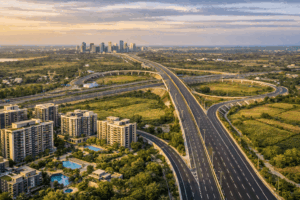Buying a property in Gurgaon is one of the most rewarding investments you can make. However, completing the property registration process is a crucial step that legally transfers ownership from the seller to the buyer. To avoid delays or disputes, you must be aware of all the documents required for property registration in Gurgaon.
Table of Contents
In this comprehensive guide, we’ll walk you through the list of essential documents, the registration process, and key tips every homebuyer should know before registering their property.
Why Property Registration is Important
Property registration in Gurgaon is more than a legal formality—it is proof of ownership and protects you against potential fraud or disputes. Once registered, the buyer’s name officially appears in the government records, confirming legal ownership of the property.
Under the Registration Act, 1908, every sale of immovable property above ₹100 must be registered with the Sub-Registrar’s Office to be legally valid.
To understand more about how property laws and real estate norms work in Gurugram, check out our blog on a complete guide to buying a property in Gurugram.
Key Documents Required for Property Registration in Gurgaon
Before heading to the Sub-Registrar’s Office, make sure you have all the documents required for property registration in Gurgaon ready and verified. Below is the complete checklist:
1. Sale Deed (Original and Copy)
The Sale Deed is the most critical document that acts as proof of ownership transfer from the seller to the buyer. It must be duly signed by both parties and registered with the local Sub-Registrar.
2. Encumbrance Certificate
This certificate ensures that the property is free from any legal dues, loans, or mortgages. It’s one of the essential documents required for property registration in Gurgaon to confirm the property’s clear title.
3. Khata Certificate and Extract
Issued by the Municipal Corporation, the Khata Certificate confirms that the property is registered under the buyer’s name for tax purposes.
4. No Objection Certificate (NOC)
If the property is part of a housing society or development project, you’ll need an NOC from the builder, society, or relevant authority stating that there are no pending dues or legal issues.
5. Identity Proofs of Buyer and Seller
You’ll need valid ID proofs such as:
- Aadhaar Card
- PAN Card
- Passport
- Voter ID
For company-owned properties, registration documents of the company and authorized signatory IDs are mandatory.
6. Property Tax Receipts
You must provide the latest property tax receipts to show that all dues have been cleared up to the date of registration.
7. Approved Building Plan and Occupancy Certificate
For newly constructed properties, attach the approved building plan and occupancy certificate issued by the local authority. If you’re buying a new home or flat, it’s important to know how FSI (Floor Space Index) affects your property size and layout. Learn more in our blog on understanding FSI in real estate.
8. Power of Attorney (If Applicable)
If the transaction is being conducted through a representative, a registered Power of Attorney (POA) is necessary.
9. Sale Agreement or Allotment Letter
For under-construction or developer projects, include the sale agreement or allotment letter issued by the builder.
If you’re buying a home from reputed builders, explore Ganga Realty’s luxury projects in Gurgaon — known for transparent transactions and complete registration support.
Step-by-Step Process for Property Registration in Gurgaon
Here’s a quick overview of the property registration process in Gurgaon:
- Calculate Stamp Duty & Registration Charges
The Haryana government levies stamp duty based on the property’s market value. You can use the official portal to calculate this. - Purchase E-Stamp Paper
Buy an e-stamp paper of the required value online or from authorized centers. - Prepare the Sale Deed
Draft the sale deed on stamp paper, ensuring all terms and property details are accurate. - Visit the Sub-Registrar’s Office
Both buyer and seller must appear at the Sub-Registrar’s Office in Gurgaon with all documents required for property registration. - Verification and Biometric Registration
Authorities will verify documents and capture biometric details of both parties. - Receive Registered Deed
After successful verification and payment, you’ll receive your registered property deed, confirming legal ownership.
To understand property size calculations before registration, read our blog on the difference between carpet area, built-up area, and super built-up area.
Stamp Duty and Registration Charges in Gurgaon
Below are the standard rates for property registration in Gurgaon:
| Category | Stamp Duty | Registration Fee |
|---|---|---|
| Male | 7% | 1% |
| Female | 5% | 1% |
| Joint (Male & Female) | 6% | 1% |
Note: Charges may vary slightly depending on property type, location, and current government policies.
Tips to Ensure Smooth Property Registration
- Always verify the authenticity of the seller’s documents before proceeding.
- Ensure there are no pending dues with the property developer or society.
- Keep digital and physical copies of all documents required for property registration in Gurgaon for future reference.
- Engage a professional property lawyer if the deal involves high-value or complex ownership history.
- Choose reputed real estate developers like Ganga Realty that offer legal and documentation assistance throughout the buying process.
Not sure how to calculate your property area correctly? Use insights from our blog on the carpet area calculator to understand how your property size impacts registration charges and pricing.
Conclusion
Understanding the documents required for property registration in Gurgaon is essential to ensure a transparent and hassle-free property purchase. Keeping your paperwork complete and verified will save time, prevent legal complications, and secure your property ownership for the long term.
If you’re planning to invest in premium or ultra-luxury apartments, check out Ganga Realty’s landmark projects like Anantam 85, Nandaka 84, and Ganga Valley 78 — each designed to redefine luxury living in Gurgaon.
FAQs on Property Registration in Gurgaon
2. What is the stamp duty for property registration in Gurgaon?
Stamp duty for property registration in Gurgaon is 7% for male buyers, 5% for female buyers, and 6% for joint ownership (male & female). Additionally, there’s a 1% registration fee applicable on the total property value.
3. Where can I register my property in Gurgaon?
You can register your property at the Sub-Registrar’s Office (SRO) under whose jurisdiction the property is located. Buyers and sellers must be physically present along with all documents required for property registration in Gurgaon.
4. How long does it take to complete property registration in Gurgaon?
Once all documents are verified and fees paid, property registration in Gurgaon is usually completed within 2–3 working days. The registered deed can then be collected or downloaded from the Haryana Jamabandi portal.
5. How much does it cost to register a property in Gurgaon?
The transaction value determines Gurgaon property registration charges. Registration fees range from Rs 100 to Rs 15,000. For properties valued Up to Rs 50,000, it should be Rs 100, while Rs 15,000 for properties valued exceeding Rs 25,00,000.
6. Can property registration be done online in Gurgaon?
You can calculate stamp duty, generate e-stamp papers, and book appointments with the Sub-Registrar online. However, physical presence is still required for biometric verification.
7. Can Ganga Realty assist with property registration in Gurgaon?
Yes, Ganga Realty provides complete assistance with legal documentation and registration for all its projects, including Anantam 85, Nandaka 84, and Ganga Valley 78 — ensuring a smooth, transparent, and hassle-free home-buying experience.








